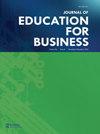Mutatis mutandis: An abstraction with reusable building block used to teach business process modeling
IF 0.7
Q2 EDUCATION & EDUCATIONAL RESEARCH
引用次数: 0
Abstract
Abstract Abstraction in business processes (BP) modeling arises from the recognition of similarities to the detriment of its differences. However, teaching modeling to beginning students in the context of process management is a hard task to perform, given the high level of abstraction required for these students to develop. This paper uses BP fragments to facilitate the teaching of BP modeling. Thus, two different process models were used from a BP Office. This observation resulted in the fragments being abstracted and defined by a group of students, later another group applied the third model. Thus, two fragments were abstracted, specified, and reused. In addition to the approach itself and the template used to define the fragments here presented, this research’s main contribution is the role that abstraction plays in BP learning and modeling skills. Finally, the fragments were validated by ten specialists, who emphasized the feasibility of using these fragments.Mutatis比照:一个具有可重用构建块的抽象,用于教授业务流程建模
摘要业务流程建模中的抽象源于对相似性的认识,而对其差异的损害。然而,鉴于这些学生的发展需要高水平的抽象,在流程管理的背景下向初学建模的学生教授建模是一项艰巨的任务。本文使用BP片段来方便BP建模的教学。因此,BP办公室使用了两种不同的流程模型。这一观察结果导致片段被一组学生抽象和定义,后来另一组学生应用了第三个模型。因此,对两个片段进行了抽象、指定和重用。除了方法本身和用于定义这里介绍的片段的模板外,这项研究的主要贡献是抽象在BP学习和建模技能中发挥的作用。最后,十位专家对这些碎片进行了验证,他们强调了使用这些碎片的可行性。
本文章由计算机程序翻译,如有差异,请以英文原文为准。
求助全文
约1分钟内获得全文
求助全文
来源期刊

Journal of Education for Business
EDUCATION & EDUCATIONAL RESEARCH-
CiteScore
3.10
自引率
8.30%
发文量
32
期刊介绍:
The Journal of Education for Business is for those educating tomorrow''s businesspeople. The journal primarily features basic and applied research-based articles in entrepreneurship, accounting, communications, economics, finance, information systems, management, marketing, and other business disciplines. Along with the focus on reporting research within traditional business subjects, an additional expanded area of interest is publishing articles within the discipline of entrepreneurship. Articles report successful innovations in teaching and curriculum development at the college and postgraduate levels. Authors address changes in today''s business world and in the business professions that are fundamentally influencing the competencies that business graduates need. JEB also offers a forum for new theories and for analyses of controversial issues. Articles in the Journal fall into the following categories: Original and Applied Research; Editorial/Professional Perspectives; and Innovative Instructional Classroom Projects/Best Practices. Articles are selected on a blind peer-reviewed basis. Original and Applied Research - Articles published feature the results of formal research where findings have universal impact. Editorial/Professional Perspective - Articles published feature the viewpoint of primarily the author regarding important issues affecting education for business. Innovative Instructional Classroom Projects/Best Practices - Articles published feature the results of instructional experiments basically derived from a classroom project conducted at one institution by one or several faculty.
 求助内容:
求助内容: 应助结果提醒方式:
应助结果提醒方式:


